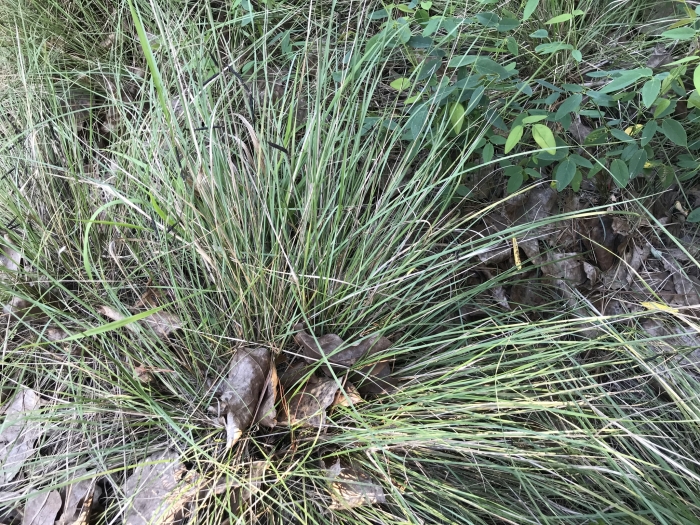Black Oat Grass
(Piptochaetium avenaceum)
Black Oat Grass (Piptochaetium avenaceum)
/
/

© Raven Dandridge
CC BY 4.0
Image By:
© Raven Dandridge
Recorded By:
Copyright:
CC BY 4.0
Copyright Notice:
Photo by: © Raven Dandridge | License Type: CC BY 4.0 | License URL: http://creativecommons.org/licenses/by/4.0/ | Uploader: feroxara | Publisher: iNaturalist |























Estimated Native Range
Summary
Piptochaetium avenaceum, commonly known as black oat grass or blackseed needle grass, is a perennial bunchgrass native to a variety of habitats in eastern North America, including open woodlands, meadows, and prairies, particularly in the Great Lakes region and the southeastern United States. It typically grows up to 3 feet tall and features fine, bristle-like leaves that contribute to its airy and delicate appearance. The plant produces open inflorescences with slender branches that sway gracefully in the breeze, giving it a floating effect. Black oat grass blooms in late spring to early summer, with flowers that are not particularly showy but have a subtle charm.
Black oat grass is valued for its drought tolerance and ability to thrive in a range of soil conditions, from well-drained to somewhat dry soils. It is often used in ornamental gardening for its textural contrast and movement, and it is also effective for erosion control due to its bunching growth habit. Additionally, it serves as a cover crop in agricultural settings. In cultivation, it prefers full sun to light shade and requires minimal maintenance once established. While generally disease-free, it can occasionally suffer from rust or fungal leaf spots. This grass is not known for aggressive roots or invasiveness, making it a safe choice for gardeners.CC BY-SA 4.0
Black oat grass is valued for its drought tolerance and ability to thrive in a range of soil conditions, from well-drained to somewhat dry soils. It is often used in ornamental gardening for its textural contrast and movement, and it is also effective for erosion control due to its bunching growth habit. Additionally, it serves as a cover crop in agricultural settings. In cultivation, it prefers full sun to light shade and requires minimal maintenance once established. While generally disease-free, it can occasionally suffer from rust or fungal leaf spots. This grass is not known for aggressive roots or invasiveness, making it a safe choice for gardeners.CC BY-SA 4.0
Plant Description
- Plant Type: Grass
- Height: 1-3 feet
- Width: 2-3 feet
- Growth Rate: Moderate
- Flower Color: N/A
- Flowering Season: Spring, Summer
- Leaf Retention: Deciduous
Growth Requirements
- Sun: Full Sun, Part Shade
- Water: Low
- Drainage: Medium, Fast
Common Uses
Deer Resistant, Drought Tolerant, Erosion Control, Low Maintenance
Natural Habitat
Open woodlands, meadows, and prairies
Other Names
Common Names: Blackseed Needlegrass, Needlegrass, Blackseed Speargrass, Black Bunchgrass
Scientific Names: , Piptochaetium avenaceum, Piptochaetium avenacellum, Piptochaetium leianthum, Podopogon avenaceus, Podopogon avenaceus, Podopogon barbatus, Podopogon barbatus, Stipa avenacea, Stipa avenacea var. avenacea
GBIF Accepted Name: